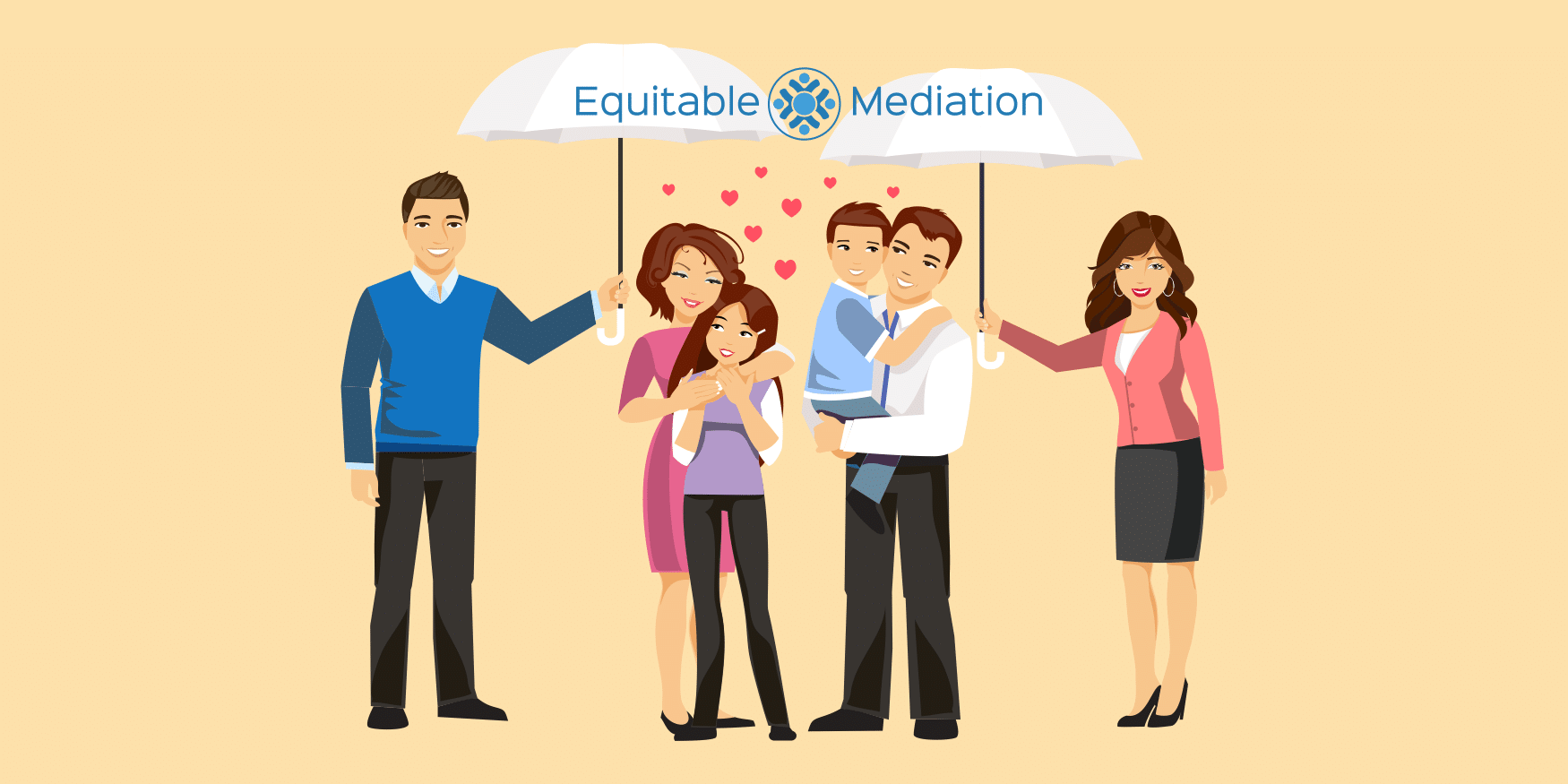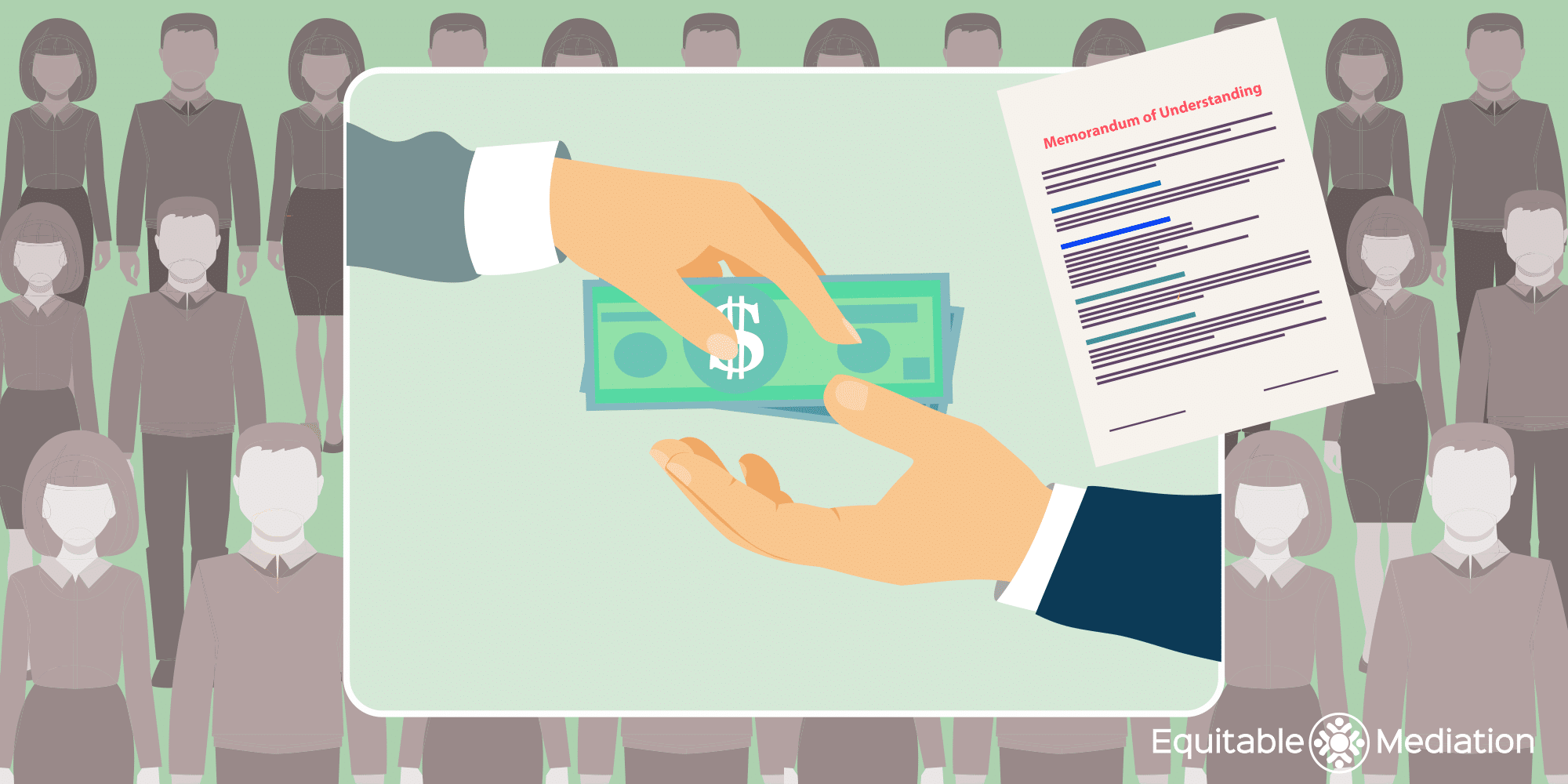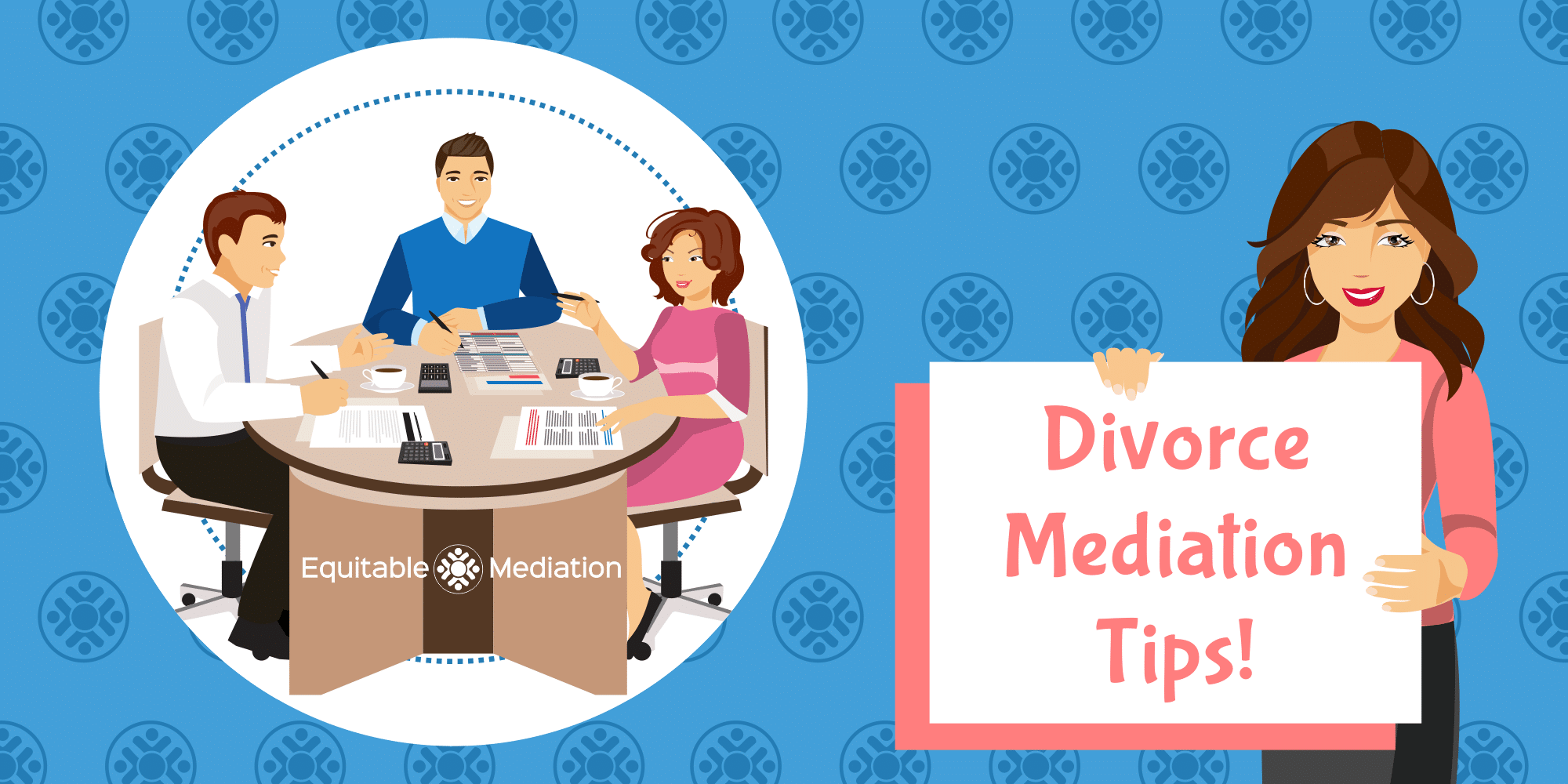Collaborative divorce vs mediation is a critically important decision couples need to make. But with so much at stake, how to decide which divorce option is best isn’t easy, as there are many differences between collaborative divorce and mediation including: cost, time to complete, and approach, among many other things.
In this post, we’ll take a closer look at collaborative law vs mediation so you can decide which one is right for you.
Collaborative divorce vs mediation? You decide.
There’s a lot more to these divorce options and how they work, but here’s an overview for each.
Divorce mediation process overview:

Divorce mediation is a cost effective, cooperative, divorce method (alternative dispute resolution process) whereby a neutral third-party (the Mediator) will help and guide a couple through resolving the issues and financial matters of divorce.
It requires voluntary participation from you and the other party. And the mediator works for both you and your spouse.
Mediation is confidential and the conversations had in session are never a matter of public record. Giving couples the freedom to discuss, without fear of judgement or reprisal, all issues relevant to their divorce.
There is no requirement that a mediator be an attorney and in fact, some of the most qualified mediators aren’t lawyers at all.
When a couple chooses to mediate, lawyers are not also required at any point in their divorce unless either spouse or both choose to involve a separate attorney(s). That makes mediating a good option for those who prefer to divorce without attorneys.
The divorce mediator will:

- Help you and your spouse (the parties) identify and understand the relevant subjects that need to be addressed in your divorce so informed decisions can be made by each of you;
- Act as peacemaker while guiding negotiations between you and your husband or wife on any areas of disagreement with the goal of reaching a positive outcome;
- Bring options to the table and help you create a mutually acceptable divorce agreement that is customized to the unique needs of your situation and the unique needs of your children pertaining to your parenting plan and time sharing, child support, alimony (spousal support/maintenance/spousal maintenance), property division of marital assets and liabilities and other important topics;
- Draft much of the required paperwork including a Memorandum of Understanding which outlines the tenants of your agreement.
Collaborative divorce process overview
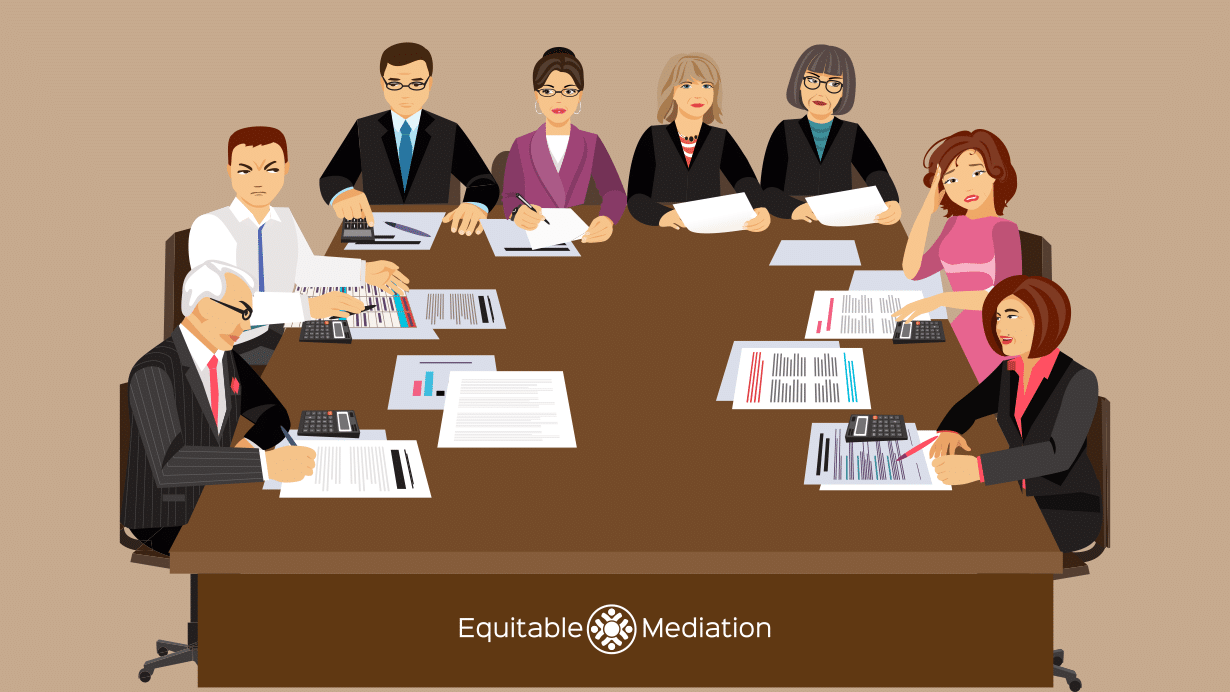
A collaborative divorce (also known as collaborative law process) is a hybrid between a traditional divorce using attorneys and divorce mediation.
- Each party would hire their own collaborative divorce attorney (a lawyer trained in the collaborative practice) to represent them. Just like in a traditional divorce situation, the goal of a collaborative divorce lawyer is to try to get the most favorable outcome for their one client – a divorce attorney can only represent one person;
- Both parties and their respective collaborative family law attorney signs a contract that states they are committed to using cooperative dispute resolution techniques instead of combative tactics to negotiate the various divorce issues. The contract is called a “participation agreement”;
- In collaborative divorce, a series of meetings take place in a law office between both spouses and their respective collaborative attorney along with other professionals as needed (such as financial professionals, child specialists, mental health professionals and a mediator to negotiate and try to come to agreement on the subjects;
If a mutually satisfactory outcome cannot successfully be reached on the relevant divorce issues using collaborative divorce, each divorce attorney will be disqualified from representing their respective client.
The couple (parties) will then continue with a litigated divorce through family law court proceedings, but will need to start over with new/different attorneys.
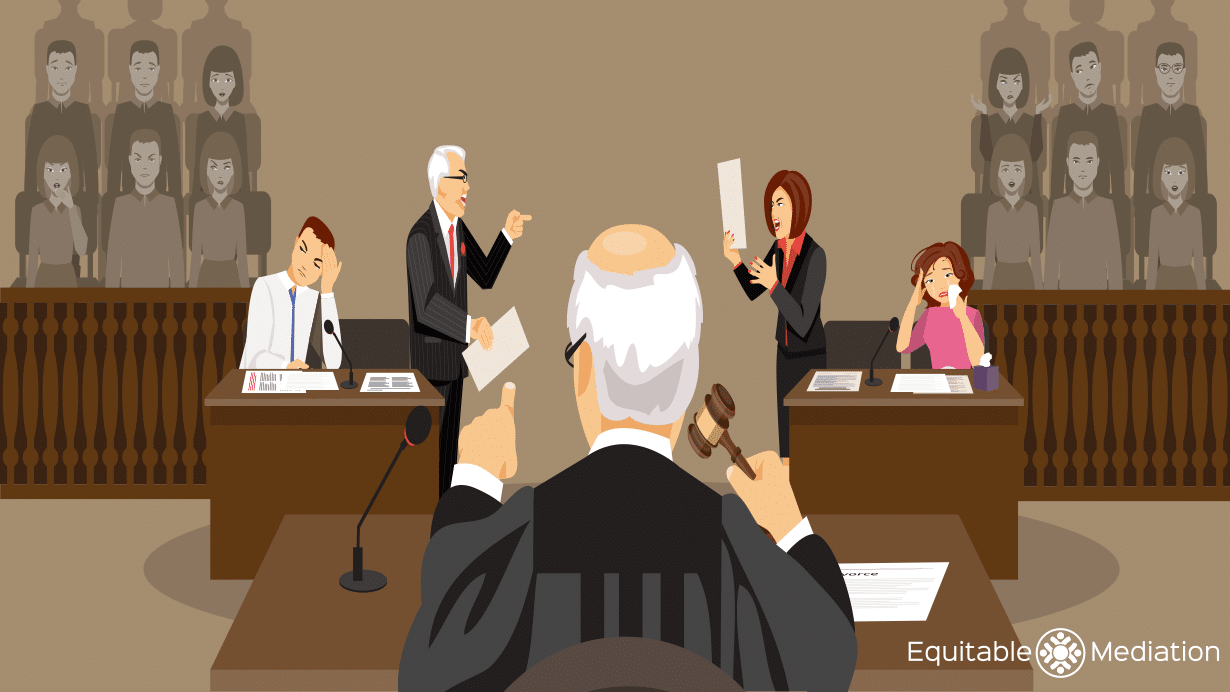
Mediation vs collaborative law: Other differences between the two options:
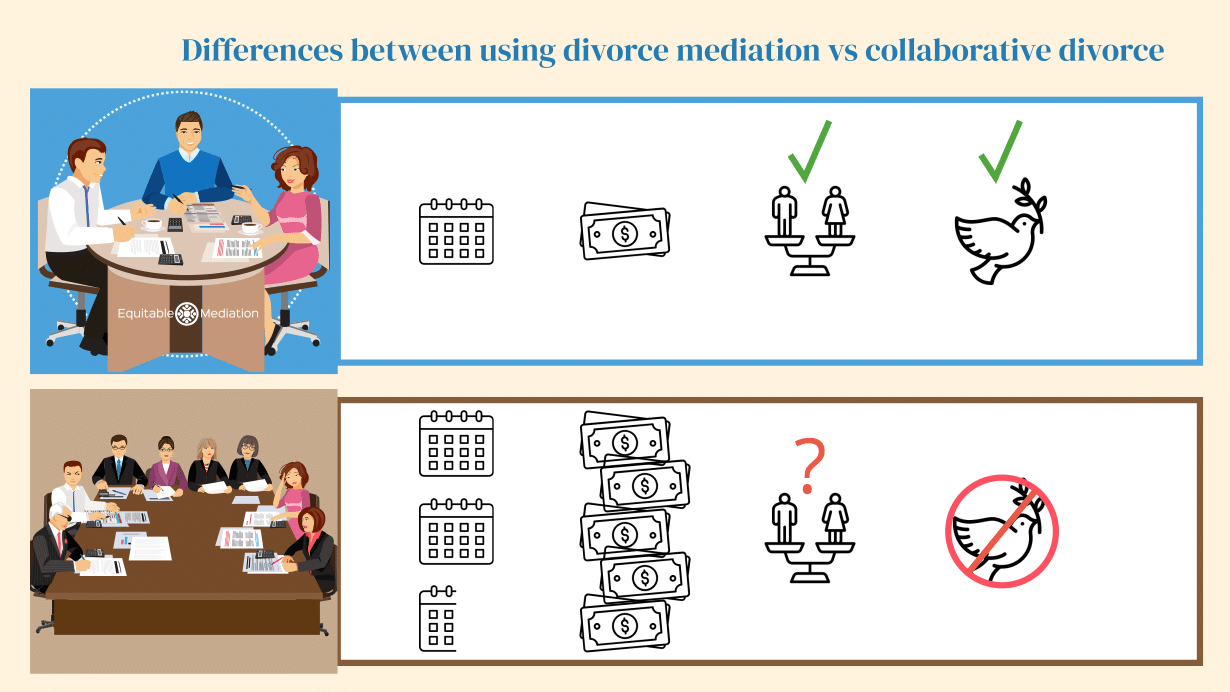
There are 7 key features of comparison between these two methods couples will want to familiarize themselves with to make the best choice in their unique situation.
Number of professionals involved:
- In divorce mediation, couples work with 1 mediator.
- In collaborative, there are 2 lawyers, plus other outside professionals including: one or more financial experts, custody specialists, therapists or a divorce coach, and a mediator.
Neutrality:
- Mediators are neutral third parties and don’t take sides. In the divorce mediation process, they work with a divorcing couple together to help them reach mutually agreeable solutions that are fair to both and are in the children’s best interest.
- A collaborative lawyer (or any type of attorney) can only represent one spouse and their job is to advocate for their one client. So in the collaborative process, each spouse would have their own lawyer to advocate for them.
Advice vs information:
- A divorce mediator empowers their clients to make their own decisions.
- Lawyers give advice and advise parties what to do.
Time to completion:
- A mediated divorce can take 3 to 6 months to complete and the speed and pace of the process is primarily directed by the two spouses. The issues can typically be resolved in two to five mediation sessions. Once the issues are resolved, the speed of the uncontested divorce is related to the time it takes to file the divorce and get a court date to finalize the proceedings.
- Collaborative can take 8 to 14 months to complete. The issues can typically be resolved in four to six group sessions that vary in duration. The speed of the process is determined not only by how quickly all issues can be resolved, but, since there are a number of other people involved, also by the ability to coordinate the calendars of each party and their collaborative law attorney, the financial professional(s), the child specialist(s), therapist(s), conflict coach, etc. Other factors are related to the court process of filing, obtaining a court date, etc.
Cost:
- The total cost of divorce through mediation typically ranges from $6,000 to $10,000 per couple.
- The cost of collaborative varies and can range from $25,000 to $50,000 depending on case complexity, the cooperation level between the parties and the number of outside professionals engaged in the process. If the collaborative process is unsuccessful and a case subsequently goes to trial, the cost of a divorce can range from $78,000 to $200,000.
Certainty of outcomes:
- In a private mediation, since both parties have direct input into defining the terms of their settlement agreement, outcomes are certain and guaranteed.
- Collaborative divorce process can be risky because if agreement cannot successfully be reached on all outstanding issues, the lawyers will be disqualified from representing the parties. The spouses would then need to start over again and each would need to hire their own new divorce attorney as they proceed into the litigation process. Divorce litigation is also risky because there are no guarantees as to what a judge’s ruling will be for the issues.
Peaceful:
- Divorce Mediation is cooperative and non-adversarial. There are 3 participants working together in direct negotiation: the mediator and the two divorcing spouses.
- Despite the 4 or more parties sitting in the same room, collaborative divorce is still an adversarial process. The very nature being represented by counsel fosters an “us versus them” mentality.
Collaborative divorce vs mediation: Which should you choose?
Now that you’ve learned about the key differences and how they may apply to your unique circumstances, here are some reasons to choose a divorce mediator and some to choose collaborative divorce.
Use mediation vs collaborative divorce when:
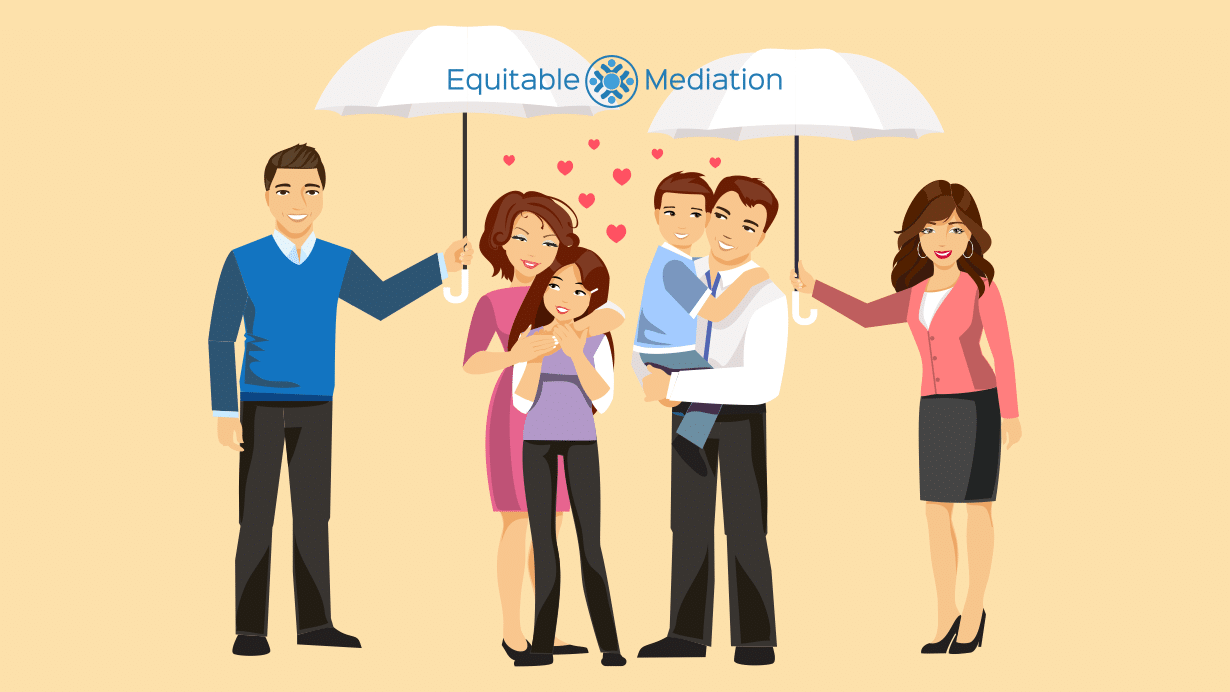
1. You want what’s best for your family.
In mediation, your children take center stage as you will be making decisions as parents, keeping your children’s best interests in mind.
2. You want a high level of control over the terms of your settlement.
You’ll both have a high level of control over your settlement because you both will have a direct say in creating its terms and conditions.
In mediation, you won’t get legal advice or be told what to do. Instead, you will be fully empowered to make your own informed decisions.
You and your spouse will both have the opportunity to voice your concerns, be heard and have a direct say in the terms of your settlement.
Your agreement will only be final when both parties agree and say it is. In mediation, you will have the opportunity to change your mind on issues as many times as you need to throughout the process.
3. You want your agreement to be fair to both you and your spouse.
Because the mediator is a neutral, third party mediator who doesn’t take sides, their job is to help you reach an agreement that you both find fair.
4. You want to keep things peaceful.
Mediation is a non-adversarial and cooperative process.
You don’t need to agree on everything or be the best of friends in order to mediate your divorce. The mediator is a skilled professional and will help you negotiate the issues you do not agree on.
If you and your soon-to-be ex are both willing to mediate, mediation can work for you. And you can peacefully divorce without a lawyer.
5. You don’t want your divorce proceedings to drag on forever.
When you look at divorce mediation vs the lawyer-driven collaborative law process, mediated divorces take significantly less time to complete.
The speed of mediation is controlled by you.
And in mediation, all communications take place in real time so any disagreements can be discussed and resolved right away.
6. You want to save money.
Collaborative divorce is very expensive.
You’ll not only need to pay your respective lawyers for all of their time, but you’ll also have to pay for any other outside professionals brought into the divorce process, including the financial expert(s), custody specialist(s), therapist(s), coach(es), etc.
But if you mediate and select a highly skilled mediator, you’ll get a thorough agreement while saving tens of thousands of dollars on your divorce.
7. You and your spouse are both willing to cooperate and keep your proceedings transparent.
Mediation requires full disclosure and transparency in order to work.
So you both must be willing to engage in a good faith negotiation and you both must be willing to compromise.
Use collaborative divorce vs mediation when:
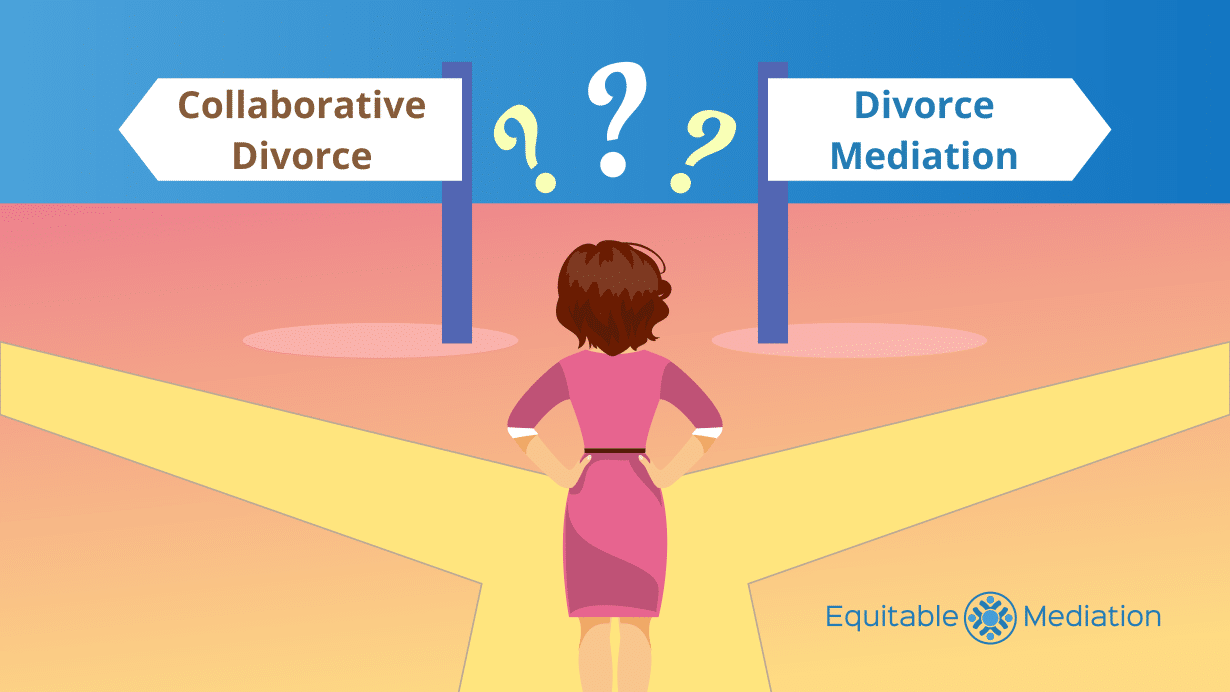
1. You cannot use mediation but still want legal guidance to try to avoid litigation.
If your divorce case is problematic and you cannot use mediation services due to a dishonest, aggressive, uncooperative or reluctant spouse but you and your spouse still want to try to avoid litigation, it might be worth a try to engage collaborative professionals.
Collaborative divorce costs significantly more than divorce mediation, but less than litigation.
2. You want legal advice and legal representation from an advocate who works for you and only you.
Since your lawyer will be representing you and only you, he/she can give you advice throughout the proceedings and advocate on your behalf if that is what you want.
The bottom line
This is your divorce, so the decision to use divorce mediation, or pursue a collaborative divorce, depends on personal choice, as well as your circumstances.
Hopefully, after reading this article, you feel more knowledgeable about the differences in these different divorce methods, in order to choose the option right for you.



